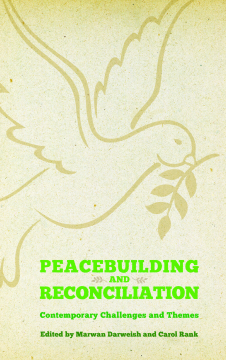
Additional Information
Book Details
Abstract
Peacebuilding and Reconciliation brings together a number of critical essays from members of the renowned Centre for Peace & Reconciliation Studies.
This highly topical book covers the latest developments and issues in the discipline of peacebuilding and reconciliation, using different global case studies of societies experiencing or emerging out of violent conflict. It brings together a range of scholars, including many from the global south, who provide fresh perspectives and insights based on their experience of living and working in conflict situations. The book connects theory and practice, drawing both on academic research and direct experience of conflict situations, and explores how to meet the challenges involved in peacebuilding and reconciliation.
Peacebuilding and Reconciliation is a cutting-edge collection ideal for students and academics in peace studies, development studies and international relations.
'Combining direct personal experience with clear theoretical understanding in a range of practical examples, the authors of this book, many from the 'global south', seek to show how sustainable peace can best be promoted even in the most war-torn countries. They succeed admirably'
Professor Oliver Ramsbotham, Centre for Conflict Resolution, Department of Peace Studies, University of Bradford
'Fascinating, engaging with the detailed complexity and special features of conflict situations and attempts to build peace, and applying an extensive literature'
Gordon Burt, Chair of the Conflict Research Society
'Using case studies from countries like Canada, Northern Ireland, Israel/Palestine, Afghanistan, Kosovo, Nepal, Ethiopia, Sierra Leone and the Democratic Republic of Congo, the authors share their experiences and articulate a range of issues which are central to conflict transformation and peace building'
Dr. Deusdedit R.K Nkurunziza, Makerere University, Uganda
Table of Contents
| Section Title | Page | Action | Price |
|---|---|---|---|
| Cover | Cover | ||
| Contents | v | ||
| Acknowledgements | vii | ||
| Introduction | 1 | ||
| Part I - Peace: But What Kind of Peace? | 13 | ||
| 1. How has the Liberal Peace served Afghanistan? - Chrissie Hirst | 15 | ||
| 2. The obstacles to sustainable peace and democracy in post-independent Kosovo - Gëzim Visoka | 32 | ||
| 3. Ethnicity, ethnic conflicts and secessionism in Ethiopian politics - Bezawit Beyene | 44 | ||
| Part II - Reconciliation and Dealing with the Past | 59 | ||
| 4. State failure and civil society potential: reconciliation in the Democratic Republic of Congo - Verity Mould | 61 | ||
| 5. Remembering the past and reconciling for the future: the role of indigenous commemorative practices in Sierra Leone - Steve Kaindeneh | 72 | ||
| 6. Decolonization and reconciliation: the colonial dilemma of Canada's residential school apology and restitution - Patricia Elgersma | 87 | ||
| Part III - Cultural Processes and Initiatives | 103 | ||
| 7. Is 'interreligious' synonymous with 'interfaith'? The roles of dialogue in peacebuilding - Sarah E. Bernstein | 105 | ||
| 8. The role of health in building peace: the case of Afghanistan - Wossenyelesh Kifle | 119 | ||
| Part IV - Challenges to Peacebuilding and Reconciliation | 135 | ||
| 9. The new economy of terror: motivations and driving forces behind contemporary Islamist insurgencies - Peter Keay | 137 | ||
| 10. The question of home: refugees and peace in the Israel-Palestine conflict | 151 | ||
| 11. Hamas: between militarism and governance - Ibrahim Natil | 166 | ||
| 12. Returning home towards a new future: Nepal's reintegration programme for former child soldiers - Dilli Binadi | 183 | ||
| References | 201 | ||
| Index | 221 |
